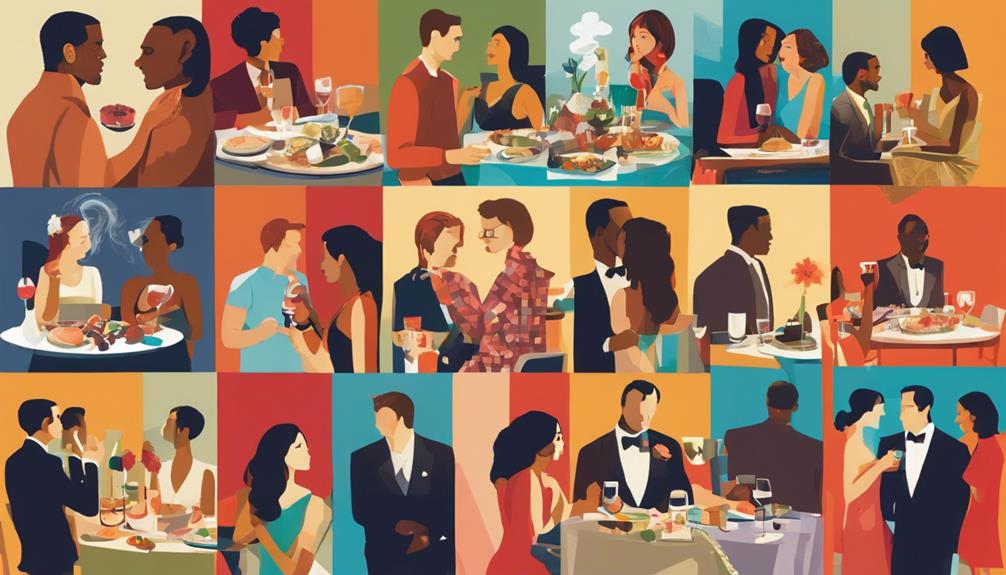Cultural norms on marital infidelity are changing due to various interconnected factors. As gender roles evolve, people are encouraged to communicate openly about their needs and desires without fear. Technology plays a significant role, providing secretive avenues for emotional and physical connections outside marriage. Additionally, shifting moral standards prioritize personal authenticity and understanding over rigid codes, allowing for nuanced discussions about fidelity. Media representation also reshapes perceptions, romanticizing or trivializing affairs. With globalization, diverse beliefs about commitment surface, making infidelity more culturally complex. Exploring these dynamics reveals even deeper insights into this cultural transformation.
Historical Perspectives on Infidelity

Throughout history, societies have woven complex narratives around marital infidelity, reflecting their unique values and norms while shaping individual behaviors and relationships.
In ancient cultures, infidelity often had different meanings; it could signify power or status rather than moral failing. Victorian attitudes, however, turned infidelity into a scandalous act, heavily influenced by strict gender expectations and religious influences that deemed women's fidelity paramount while men faced lesser scrutiny.
The social consequences of infidelity were severe; it could lead to ostracism or divorce, with legal repercussions reinforcing these societal norms.
Psychological theories emerged to explain motivations behind infidelity, suggesting that unmet emotional or sexual needs could drive individuals to seek fulfillment outside their marriages.
Economic factors also played a role; in many societies, marriage was less about love and more about securing financial stability. This transactional nature often left individuals feeling trapped, sometimes prompting infidelity as a form of rebellion against oppressive structures.
Ultimately, understanding these historical perspectives helps you grasp how deeply ingrained cultural norms have shaped contemporary views on marital infidelity, revealing the complex interplay between personal desires and societal expectations.
The Impact of Technology
The rise of digital communication and social media has drastically transformed the landscape of marital infidelity. It has made it easier for individuals to engage in extramarital relationships while complicating the dynamics of trust and intimacy within marriages.
You might notice how online dating platforms have proliferated, providing discreet avenues for people seeking connections outside their commitments. These apps and websites cater to a variety of desires, often blurring the lines between casual encounters and serious affairs.
Social media adds another layer of complexity. You can scroll through your feed and see friends or acquaintances sharing intimate moments, which can stir feelings of jealousy or inadequacy. The constant access to potential partners can tempt even the most committed individuals, as they engage in flirtation and emotional connections through likes, comments, and direct messaging.
This digital landscape challenges traditional notions of fidelity. You might find yourself questioning what constitutes betrayal when emotional affairs can unfold online, often without physical contact.
As technology reshapes communication, it also reshapes expectations within relationships, making trust more elusive than ever. In this evolving world, understanding the impact of technology on infidelity is essential for steering modern relationships.
Shifting Gender Roles

As technology reshapes how we connect, it's also redefining gender roles in relationships, leading to a reevaluation of expectations around fidelity and commitment. You might notice that traditional gender norms are slowly giving way to more fluid equality dynamics.
In the past, relationship expectations often dictated that men were the primary breadwinners, while women managed the home. Today, these roles are increasingly interchangeable, allowing both partners to contribute financially and emotionally.
This shift encourages open dialogue about infidelity and commitment. With both partners sharing responsibilities and desires more equally, discussions about boundaries and expectations become essential. You may find that this new dynamic fosters honesty, where partners feel empowered to express their needs without fear of judgment.
As gender roles evolve, the societal stigma surrounding infidelity is also changing. You might observe that individuals are more willing to question outdated norms and redefine what commitment means to them.
This reexamination can lead to healthier relationships, where mutual respect and understanding take precedence over rigid expectations, paving the way for more fulfilling connections.
Changing Moral Standards
Moral standards surrounding marital infidelity are evolving, reflecting a broader cultural shift that prioritizes personal authenticity over rigid societal expectations. You might notice that changing attitudes toward relationships encourage individuals to embrace their desires rather than conform to traditional norms. This shift signifies a move towards moral relativism, where the context and personal circumstances heavily influence what's deemed acceptable.
As societal values transform, you may find that infidelity is increasingly viewed through a lens of understanding rather than outright condemnation. People often consider the motivations behind infidelity—be it emotional dissatisfaction, a search for fulfillment, or simply human imperfection. The focus now lies on communication and honesty within relationships, rather than adhering to an inflexible moral code.
This evolving perspective allows you to navigate your relationships with greater complexity, recognizing that each situation is unique. Consequently, the stigma associated with infidelity is diminishing, prompting discussions about boundaries and expectations. By embracing these changing moral standards, you're encouraged to engage in deeper conversations about love, commitment, and the nature of fidelity itself, ultimately reshaping how society views marital infidelity.
Influence of Media Representation

Media representation plays an essential role in shaping public perceptions of marital infidelity, often blurring the lines between reality and dramatization. When you watch films or TV shows that portray infidelity, you're likely to notice how these narratives often glamorize or trivialize the act. This media portrayal creates a perception that infidelity is more common and accepted than it might actually be in real life.
As you consume these stories, you might find your views on relationship dynamics shifting, particularly regarding trust and commitment. Characters who engage in affairs are frequently depicted as thrill-seekers or victims of unmet desires, which can desensitize you to the emotional fallout of such actions. This portrayal can lead you to question whether infidelity is an inevitable part of romantic relationships or simply a dramatic plot device.
Moreover, the nuanced representations of infidelity in various media formats can foster discussions about love, loyalty, and betrayal. As you reflect on these portrayals, you might be influenced to reconsider your own beliefs about marital fidelity, ultimately contributing to the changing cultural norms surrounding infidelity.
Globalization and Cultural Exchange
Globalization has woven diverse cultural narratives into a complex tapestry that influences attitudes toward marital infidelity across different societies. As you navigate through this interconnected world, you'll notice how cultural diffusion plays a significant role in shaping perceptions of fidelity. With increased travel and communication, you're exposed to varying beliefs about relationships, which can challenge traditional norms.
Cross-cultural interactions allow you to witness different views on commitment and infidelity. In some cultures, infidelity might be stigmatized, while in others, it may be seen as an acceptable expression of personal freedom. The blending of these perspectives can lead to evolving attitudes, as you adapt and incorporate new ideas into your own belief system.
Social media and global networks further amplify this exchange, making it easier to share experiences and opinions on marital fidelity. As you engage in discussions, your understanding of infidelity may shift, reflecting a broader, more nuanced perspective.
Ultimately, as globalization continues to unfold, you'll find that cultural norms around marital infidelity are increasingly fluid, adapting to the rich tapestry of human experience that spans across borders.
Psychological Factors at Play

Emotional needs and psychological motivations often drive individuals toward infidelity, revealing deeper complexities in relationship dynamics that go beyond mere physical attraction.
Many people grapple with their attachment styles, which shape how they connect with partners. For instance, those with insecure attachment styles may struggle to form emotional intimacy, leading them to seek validation and closeness outside their primary relationship.
As you navigate your own relationships, consider how your emotional needs influence your choices. If you feel neglected or unfulfilled, the allure of infidelity might grow stronger. Some individuals view affairs as a way to fulfill unmet emotional desires, believing that a new connection can provide the intimacy they lack at home.
Furthermore, societal changes have made it easier to justify infidelity. People often rationalize their actions by claiming that emotional connections are no longer exclusive to marriage. This shift underscores the importance of understanding how psychological factors intertwine with cultural attitudes toward infidelity.
Ultimately, recognizing these influences can help you better navigate your own emotional landscape and foster healthier, more fulfilling relationships.
Conclusion
As you explore the changing landscape of marital infidelity, it's clear that historical perspectives, technology, and shifting gender roles play significant roles.
You can see how evolving moral standards and media portrayals reshape perceptions, while globalization fosters diverse attitudes.
Psychological factors also contribute to this complex phenomenon.
Ultimately, understanding these influences helps you grasp why infidelity norms are transforming, reflecting a broader societal shift towards more nuanced views on relationships and fidelity in contemporary life.
